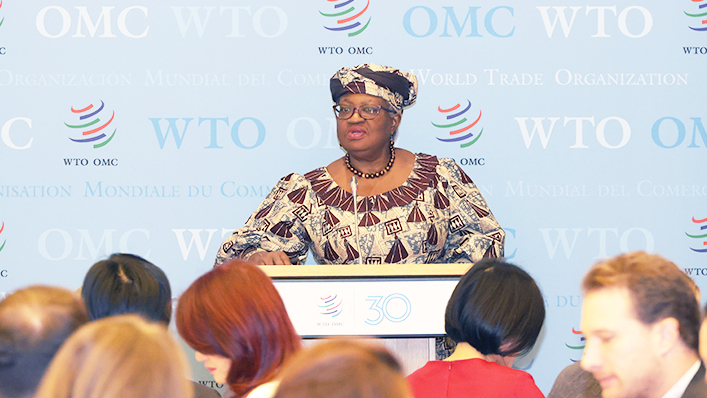
The conference saw the launch of a new report by the WTO Secretariat, “Trading with Intelligence: How AI Shapes and is Shaped by International Trade”. The report explores the potential impact of AI on international trade, highlighting for example how it can lower trade costs by improving logistics management, simplifying regulatory compliance, and enhancing communication between businesses and customers.
In her opening remarks, WTO Director-General Ngozi Okonjo-Iweala emphasized the profound societal and economic changes ushered in by AI, noting its expanding role in daily life — from autonomous vehicles and precision farming to advancements in healthcare, education and scientific research.
DG Okonjo-Iweala said: “AI could lower the barriers to market entry, providing more small businesses with the opportunity to participate in international trade.”
The DG added: “The report includes case studies where AI has been applied to detect disruptions in supply chains, trace the carbon footprint of products, and streamline customs procedures, underscoring the technology’s potential to enhance trade efficiency and sustainability.”
In her keynote speech, Baroness Maggie Jones of Whitchurch, Parliamentary Under-Secretary of State for the UK’s Department for Science, Innovation and Technology, outlined how the UK government is positioning technology, particularly AI, at the core of its economic growth strategy. She emphasized AI’s potential to reduce barriers to trade and foster inclusive economic growth.
“There is no doubt that AI will change our societies and our economies,” said Baroness Jones. “Our choice is not whether that change happens. It is whether we sit back and allow it to shape us. It is whether we actively shape the future of this technology and the world it will enable. We want that world to be one where every country has access to the opportunities that AI presents – and every citizen is protected from the potential risks. By working together, we can make that ambition a reality. ”
The conference featured a series of in-depth sessions, each addressing different aspects of AI and its impact on international trade. The first session brought together the private sector and policy makers to explore the impact of AI on international trade. The second session examined the impact of AI on trade in services, and how services trade policy and rules affect the development of AI. The third session looked at how AI can and is improving the work of customs officers and how AI can contribute to a more efficient, resilient and sustainable food and agriculture system.
Discussion in the fourth session centred on the challenges AI poses to the existing intellectual property framework which underpins trade in digital products, emphasizing the relevance of balanced IP regulation to incentivize the development, training and use of AI. The fifth session addressed the role of standards and technical regulations for ensuring trustworthy AI. The last session explored the role of international cooperation and international organizations in global AI governance.
The event also featured a fireside chat with Dani Verdari, a content creator and YouTuber who uses AI to generate creative content for social media platforms. Additionally, a “pitching session” included presentations from Google and Maersk showcasing innovative ways in which AI is being utilized to optimize business operations.
You can find full details here.
Share
Reach us to explore global export and import deals